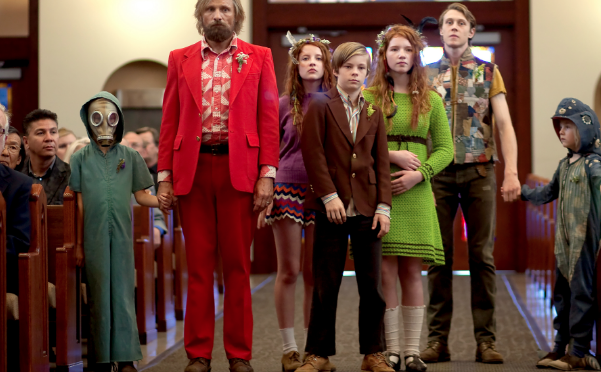This is a truth we hold to be self-evident: being a “good” parent in the current age is frequently characterized by placation, coddling and a steady diet of cud for one’s children to mindlessly feed on. Hence, Matt Ross’ fourth feature as a writer-director, Captain Fantastic, showcases the scrutiny that recently widowed Ben (Viggo Mortensen) must endure for choosing to raise his children in a self-reliant, autodidactic manner in the forests of the Pacific Northwest. His wife Leslie’s (Trin Miller) absence from their lives as a result of bipolar disorder leaves his six children, Bodevan (George MacKay), Kielyr (Samantha Isler), Vesper (Annalise Basso), Rellian (Nicholas Hamilton), Zaja (Shree Crooks) and Nai (Charlie Shotwell), utterly bereft–in a state of near freefall that prompts the older kids in the fold to question Ben’s methods.
With the dramatic introduction to the narrative seeing Bodivan kill his first deer and eat from its innards, we’re given a sense of just how “real” the children’s upbringing is. The simple, yet intellectually stimulating existence Ben creates for them is punctuated by reading such “light-hearted” classics as Middlemarch and Guns and Ammunition, as well as each child displaying mastery in an instrument that allows them to form an impromptu band whenever they feel like it. Beating to the tune of his own drum in the wake of their mother’s departure, however, is Rellian, who begins his subtle rebellion against Ben even before they learn that Leslie has killed herself by slitting her wrists. With the news delivered to Ben by his sister, Harper (Kathryn Hahn), he decides–after a heavy-duty dousing by a waterfall–to calmly inform his brood of the news. Rellian has the most viscerally Oedipal reaction, grabbing a knife and wielding it as though to stab Ben.
When the children find out the other component of the unwanted information, that their grandfather, Jack (Frank Langella, who has remained aesthetically the same since Body of Evidence), will have Ben arrested if he shows up to the funeral in New Mexico, their sadness is augmented tenfold for being essentially forbidden from getting one final goodbye.
But Ben, Jesse Jackson-wearing t-shirt, anti-establishment free thinker that he is, ultimately succumbs to the melancholy faces of his children in their magic school bus-looking vehicle by turning it in the direction of the Southwest.
Though all of the children (apart from Rellian) clearly revere their patriarch, Bodivan’s clandestine application and acceptance into every major Ivy League university indicates his latent desire to counteract some of the key tenets Ben has instilled within them–a desire driven by his realization that the interactions he has with most people in “civilization” (especially, and most importantly, women) are awkward in the extreme thanks to his hyper-intellectualism.
Ben, so consumed with the new “mission” of carrying out Leslie’s Last Will, is oblivious to the casual mutiny taking place right in front of his eyes. Upon re-entering the “mainland,” as it were, Ben satirically narrates some of the more grotesque sights linked to modern humanity (K-Mart included) by remarking on how, more than thinking, Americans love shopping–channeling all of their mind’s energy on consumerism instead of edification. This sentiment will be echoed later on, when Harper’s husband, Dave (Steve Zahn, who still occasionally crops up in film), asks, “How do you still have money?” Ben responds, “I only buy what I need.” This concept, among every other espoused by Ben, is anathema to everyone they encounter–his and his children’s IQ and reasoning abilities so enraging that it forces the drones around them to be reminded of what partaking of non-regurgitated thought was once like.
Most angered of all, of course, is Jack when Ben finally does show up in a 70s suit to the funeral with the kids in tow. The journey they’ve taken to get there is one marked by stealing food from the grocery store to the soundtrack of Bikini Kill’s “Rebel Girl” and one of reconciliation and self-discovery, almost Darjeeling Limitedesque in motif and execution.
So fixated on not allowing Leslie’s Christian (she was a Buddhist) burial to take place is Ben that he forgets who he is doing this all for in the first place: the kids. Bodivan’s brief romantic interlude with a trailer park girl named Claire (Erin Moriarty) and subsequent confession about college to Ben is the first wake up call to the latter that the proverbial spell is breaking, and that maybe his way of raising his family–a way that promotes true excellence–is a detriment to their ability to succeed in a society that has prided itself on mediocrity since the first moment public schools decided to reward students merely for attendance.
The grim reality of Ben having to pull back and allow his kids the chance to be as lackluster as they want to be in order to function in American society is that this is objectively what is considered “good” parenting. Because it’s better to rear a “normal” drooling idiot than a razor sharp-minded “freak.” Alas, fitting in is often the motivation for many an ill-advised action.






















